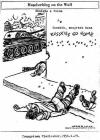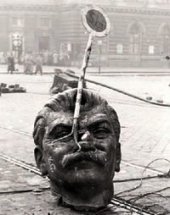Oi, Unkari sun vapautes' on jäänyt aikain taa
sun loistos häipyi usvaan hämärään
Sua idän tähden raskas kahle painaa, rasittaa
sun kansas' syömmis' kyyneleen mä nään
Sä tahdoit olla veljeskansa, aina vapaa maa
siks' toivo, oota aikaa parempaa
Mä muistan sinut Budapest, säveles' jousien
en sua koskaan unhoita, Unkarin neitonen
Ei kaiu soitto priimaksen, ei sävel csárdáksen
vain vaikerrus soi pustan viulujen
Sä usko, luota tulevaiseen, laulun, soiton maa
sä kerran vielä vapaa olla saat
Vain Luojaas luota, Unkari, Hän antaa vapauden
iloa soi taas viulusi, sävelet csárdáksen
Näät pustan tytön tanssivan ja riemastut sä, kun
näät nousevan tuon kansan sorretun
Ja kerran oot sä kuuleva tuon hymnin Petőfin
on silloin vapaa kansa Unkarin
Ja kerran oot sä kuuleva tuon hymnin Petőfin
on silloin vapaa kansa Unkarin
sun loistos häipyi usvaan hämärään
Sua idän tähden raskas kahle painaa, rasittaa
sun kansas' syömmis' kyyneleen mä nään
Sä tahdoit olla veljeskansa, aina vapaa maa
siks' toivo, oota aikaa parempaa
Mä muistan sinut Budapest, säveles' jousien
en sua koskaan unhoita, Unkarin neitonen
Ei kaiu soitto priimaksen, ei sävel csárdáksen
vain vaikerrus soi pustan viulujen
Sä usko, luota tulevaiseen, laulun, soiton maa
sä kerran vielä vapaa olla saat
Vain Luojaas luota, Unkari, Hän antaa vapauden
iloa soi taas viulusi, sävelet csárdáksen
Näät pustan tytön tanssivan ja riemastut sä, kun
näät nousevan tuon kansan sorretun
Ja kerran oot sä kuuleva tuon hymnin Petőfin
on silloin vapaa kansa Unkarin
Ja kerran oot sä kuuleva tuon hymnin Petőfin
on silloin vapaa kansa Unkarin
Contributed by CCG/AWS Staff + Juha Rämö - 2008/12/29 - 18:58
Language: Hungarian
La versione ungherese trascritta dal video YouTube
Hungarian version as reproduced from the YouTube video
Hungarian version as reproduced from the YouTube video
MAGYAR SZABADSÁG
Ó, Magyarország, szabadságod az időkben elvészett,
ragyogásod homályba tűnt
kelet Csillagának nehéz rabláncai elnyomnak,
néped szemében könnycseppet látok,
testvérnemzet, mindig szabád akartál lenni,
ezért remélj és várd a jobb időket.
Emlékszem rád, Budapest, húrjaid dallamára,
nem feledlek soha, Magyarország leánya,
nem játszik már a primás, nem szól már a csárdás,
csak a puszta hegedűjének bús dallama szól,
higgy és bízz a jövőben, ének s zene országa,
egyszer eljön még szabadságod ideje.
Csak Istenedben bízz, Magyar, Ő elhozza szabadságod,
s megint örömöt zengnek hegedűid, a csárdás dallamait,
táncolni látod a puszta lányát és örvendezel,
mikor felemelkedik az elnyomott nemzet,
és ha meghallod megint Petőfi dalát,
újra szabad lesz a magyar nép.
És ha meghallod megint Petőfi dalát,
újra szabad lesz a magyar nép.
Ó, Magyarország, szabadságod az időkben elvészett,
ragyogásod homályba tűnt
kelet Csillagának nehéz rabláncai elnyomnak,
néped szemében könnycseppet látok,
testvérnemzet, mindig szabád akartál lenni,
ezért remélj és várd a jobb időket.
Emlékszem rád, Budapest, húrjaid dallamára,
nem feledlek soha, Magyarország leánya,
nem játszik már a primás, nem szól már a csárdás,
csak a puszta hegedűjének bús dallama szól,
higgy és bízz a jövőben, ének s zene országa,
egyszer eljön még szabadságod ideje.
Csak Istenedben bízz, Magyar, Ő elhozza szabadságod,
s megint örömöt zengnek hegedűid, a csárdás dallamait,
táncolni látod a puszta lányát és örvendezel,
mikor felemelkedik az elnyomott nemzet,
és ha meghallod megint Petőfi dalát,
újra szabad lesz a magyar nép.
És ha meghallod megint Petőfi dalát,
újra szabad lesz a magyar nép.
Contributed by CCG/AWS Staff - 2008/12/29 - 20:14
Language: Italian
Versione italiana di Riccardo Venturi
(dal testo ungherese)
29 dicembre 2008
Si vedano le Note alla traduzione
(dal testo ungherese)
29 dicembre 2008
Si vedano le Note alla traduzione
LIBERTA' UNGHERESE
Oh, Ungheria, la tua libertà si era persa nei tempi,
il tuo splendore sembrava essersi oscurato
ti opprimono le dure catene di schiavitù della Stella d'oriente,
negli occhi del tuo popolo vedo lacrime,
popolo fratello*, sempre hai voluto essere libero,
per questo spera, e aspetta tempi migliori.
Ti ricordo, Budapest, e della melodia delle tue corde di violino,
non ti scorderò mai, ragazza d'Ungheria,
non suona più il capobanda, non risuona più la czarda,
risuona solo la triste melodia del violino della puszta**.
Credi e affidati al futuro, paese del canto e della musica,
un giorno tornerà il tempo della tua libertà.
Affidati solo al tuo Dio, Magiaro, Lui ti porterà la libertà,
e ancora i tuoi violini suoneranno la gioia e le melodie della czarda,
vedrai danzare la ragazza della puszta, e ti rallegrerai
quando si solleverà il popolo oppresso,
e se ancora udrai il canto di Petőfi***,
il popolo ungherese sarà di nuovo libero.
E se ancora udrai il canto di Petőfi,
il popolo ungherese sarà di nuovo libero.
Oh, Ungheria, la tua libertà si era persa nei tempi,
il tuo splendore sembrava essersi oscurato
ti opprimono le dure catene di schiavitù della Stella d'oriente,
negli occhi del tuo popolo vedo lacrime,
popolo fratello*, sempre hai voluto essere libero,
per questo spera, e aspetta tempi migliori.
Ti ricordo, Budapest, e della melodia delle tue corde di violino,
non ti scorderò mai, ragazza d'Ungheria,
non suona più il capobanda, non risuona più la czarda,
risuona solo la triste melodia del violino della puszta**.
Credi e affidati al futuro, paese del canto e della musica,
un giorno tornerà il tempo della tua libertà.
Affidati solo al tuo Dio, Magiaro, Lui ti porterà la libertà,
e ancora i tuoi violini suoneranno la gioia e le melodie della czarda,
vedrai danzare la ragazza della puszta, e ti rallegrerai
quando si solleverà il popolo oppresso,
e se ancora udrai il canto di Petőfi***,
il popolo ungherese sarà di nuovo libero.
E se ancora udrai il canto di Petőfi,
il popolo ungherese sarà di nuovo libero.
NOTE alla traduzione
* Come è, o dovrebbe essere, noto, i finlandesi e gli ungheresi sono entrambi popoli di origine ugrofinnica (e di più lontana origine uralica). La lingua ungherese e quella finlandese sono imparentate, anche se tale parentela (dimostrata alla fine del XVIII secolo) non appare certamente agli occhi, e le due lingue non sono reciprocamente intelligibili; ciononostante, in alcune parole appare ancora chiara, come ad esempio (u./f.) víz / vesi “acqua”, kéz / käsi “mano”, szém / silmä “occhio”, vér / veri “sangue” ecc. Tale “fratellanza”, seppure oggettivamente lontana, è stata comunque molto sentita nel tempo dai due popoli. Anche durante il regime comunista, ai finlandesi non era ad esempio richiesto alcun visto di entrata in Ungheria (bastava il semplice passaporto).
** La puszta (parola peraltro di origine slava) è la pianura pannonica. Alla lettera significa “luogo desertico, desolato”. E' un autentico “luogo mitologico” sia per gli ungheresi, sia per gli stranieri che s'immaginano l'Ungheria (la solitudine, il vento, la musica...)
*** Sándor Petőfi (ma al modo ungherese si dovrebbe dire: Petőfi Sándor, con il cognome prima del nome) (1823-1849) è il poeta nazionale ungherese, ed anche una delle principali figure della Rivoluzione del 1848. Volle essere ungherese: i suoi genitori erano infatti slavi (suo padre, serbo, si chiamava in realtà Stevan Petrović anche se parlava l'ungherese come lingua madre, mentre sua madre, Mária Hrúzová, era slovacca e parlava solo lo slovacco). “Magiarizzò” il cognome paterno “ Petrović” in Petőfi, che ha lo stesso significato (“Di Pietro”). La sua lirica romantica può riassumersi in due parole-chiave della lingua ungherese: szabadság, “libertà”, e szerelem, “amore”. Si dice che proprio la lettura di una sua poesia scatenò la Rivoluzione del '48 in Ungheria; si unì alle truppe del generale rivoluzionario polacco Józef Bem, che stava riportando una discreta serie di vittorie sull'esercito asburgico quando, con l'intervento della Russia a fianco dell'Austria, la rivoluzione fu schiacciata. Durante la battaglia di Segesvár (attualmente Sighişoara, in Romania), Petőfi scomparve; il suo corpo non fu mai ritrovato. Aveva 26 anni. Non a caso il “circolo” che diede l'avvio alla rivolta del 1956 prendeva il suo nome, e non a caso la scintilla del 23 ottobre avvenne durante una manifestazione studentesca sotto la statua di Józef Bem.
* Come è, o dovrebbe essere, noto, i finlandesi e gli ungheresi sono entrambi popoli di origine ugrofinnica (e di più lontana origine uralica). La lingua ungherese e quella finlandese sono imparentate, anche se tale parentela (dimostrata alla fine del XVIII secolo) non appare certamente agli occhi, e le due lingue non sono reciprocamente intelligibili; ciononostante, in alcune parole appare ancora chiara, come ad esempio (u./f.) víz / vesi “acqua”, kéz / käsi “mano”, szém / silmä “occhio”, vér / veri “sangue” ecc. Tale “fratellanza”, seppure oggettivamente lontana, è stata comunque molto sentita nel tempo dai due popoli. Anche durante il regime comunista, ai finlandesi non era ad esempio richiesto alcun visto di entrata in Ungheria (bastava il semplice passaporto).
** La puszta (parola peraltro di origine slava) è la pianura pannonica. Alla lettera significa “luogo desertico, desolato”. E' un autentico “luogo mitologico” sia per gli ungheresi, sia per gli stranieri che s'immaginano l'Ungheria (la solitudine, il vento, la musica...)
*** Sándor Petőfi (ma al modo ungherese si dovrebbe dire: Petőfi Sándor, con il cognome prima del nome) (1823-1849) è il poeta nazionale ungherese, ed anche una delle principali figure della Rivoluzione del 1848. Volle essere ungherese: i suoi genitori erano infatti slavi (suo padre, serbo, si chiamava in realtà Stevan Petrović anche se parlava l'ungherese come lingua madre, mentre sua madre, Mária Hrúzová, era slovacca e parlava solo lo slovacco). “Magiarizzò” il cognome paterno “ Petrović” in Petőfi, che ha lo stesso significato (“Di Pietro”). La sua lirica romantica può riassumersi in due parole-chiave della lingua ungherese: szabadság, “libertà”, e szerelem, “amore”. Si dice che proprio la lettura di una sua poesia scatenò la Rivoluzione del '48 in Ungheria; si unì alle truppe del generale rivoluzionario polacco Józef Bem, che stava riportando una discreta serie di vittorie sull'esercito asburgico quando, con l'intervento della Russia a fianco dell'Austria, la rivoluzione fu schiacciata. Durante la battaglia di Segesvár (attualmente Sighişoara, in Romania), Petőfi scomparve; il suo corpo non fu mai ritrovato. Aveva 26 anni. Non a caso il “circolo” che diede l'avvio alla rivolta del 1956 prendeva il suo nome, e non a caso la scintilla del 23 ottobre avvenne durante una manifestazione studentesca sotto la statua di Józef Bem.
Language: English
English Version by Riccardo Venturi
December 29, 2008
December 29, 2008
FREEDOM FOR HUNGARY
Alas!, Hungary, thy Freedom had got lost in time,
Thy splendour seemed to shine no more.
Oppressed by the hard slavery chains of the Eastern Star,
I can see tears filling the eyes of thy people.
Brotherly people! Always didst thou long for liberty,
Lose not thy Hope, and wait for better times.
I remember you, Budapest, and the tune from your fiddle strings,
And I shall never forget you, Hungarian girl.
The band director plays no more, the czardas is no more to be heard,
Only the sad melody of the Puszta fiddle can be heard, now.
Believe and trust in the future, country of songs and music,
One day the time of your Freedom will be back.
Only trust in your God, Magyar, He will bring you Freedom,
And again your fiddle will play joyfully the czardas tune!
You will see the Puszta girl dancing, and rejoice
When the oppressed people will rise.
And if you hear again Petőfi's song,
The Hungarian people will again be free.
And if you hear again Petőfi's song,
The Hungarian people will again be free.
Alas!, Hungary, thy Freedom had got lost in time,
Thy splendour seemed to shine no more.
Oppressed by the hard slavery chains of the Eastern Star,
I can see tears filling the eyes of thy people.
Brotherly people! Always didst thou long for liberty,
Lose not thy Hope, and wait for better times.
I remember you, Budapest, and the tune from your fiddle strings,
And I shall never forget you, Hungarian girl.
The band director plays no more, the czardas is no more to be heard,
Only the sad melody of the Puszta fiddle can be heard, now.
Believe and trust in the future, country of songs and music,
One day the time of your Freedom will be back.
Only trust in your God, Magyar, He will bring you Freedom,
And again your fiddle will play joyfully the czardas tune!
You will see the Puszta girl dancing, and rejoice
When the oppressed people will rise.
And if you hear again Petőfi's song,
The Hungarian people will again be free.
And if you hear again Petőfi's song,
The Hungarian people will again be free.
Dear AWS staff,
I'm glad to announce that the AWS song titled "Unkarin vapaus" is no longer anonymous.
The song was written and composed in early 1958 by Seppo Ylöstalo, the man interviewed on the Youtube video clip. At that time, he was studying at the Heinola Seminar to become a primary school teacher. One day during a music class the students were assigned by their teacher to compose a song. Ylöstalo wrote this song but never submitted it. Nor was the song ever published or performed in front of an audience before this short film from 2006.
The Finnish lyrics along with a picture of the author are attached.
Yours sincerely
Juha Rämö
I'm glad to announce that the AWS song titled "Unkarin vapaus" is no longer anonymous.
The song was written and composed in early 1958 by Seppo Ylöstalo, the man interviewed on the Youtube video clip. At that time, he was studying at the Heinola Seminar to become a primary school teacher. One day during a music class the students were assigned by their teacher to compose a song. Ylöstalo wrote this song but never submitted it. Nor was the song ever published or performed in front of an audience before this short film from 2006.
The Finnish lyrics along with a picture of the author are attached.
Yours sincerely
Juha Rämö
Juha Rämö - 2015/3/27 - 22:30
Dear Juha, this is really great from you. You helped us solve one of the oldest "mysteries" of this site, a page which has remained eight years or so without the original lyrics of the song included. Btw, I see you are no real newcomer to our site; your name didn't sound new to me, as you had already contributed a number of translations to our website (and to my old friend Walter Pistarini's site, "Via del Campo"), mostly of songs by Fabrizio De André. I wonder if you made other translations of songs by De André into Finnish. Anyway, we really appreciate your contributions disclosing the world of the Finnish antiwar, protest and freedom songs.
Riccardo Venturi - 2015/3/28 - 00:30
I'm only glad to help with new songs and versions but also with mysteries. I have, indeed, been translating songs by Faber mainly into Finnish. And I also noticed that you have fetched my translation of "Canzone del maggio" from Via del Campo. Thanks for that. Recently, I was able to complete the translation of "Dolcenera", but that one doesn't have much to do with antiwar themes, does it.
By the way, Seppo Ylöstalo is the one who made the screenplay for that Youtube video. His name appears at the end of the clip, which was the key for me to tracing him.
By the way, Seppo Ylöstalo is the one who made the screenplay for that Youtube video. His name appears at the end of the clip, which was the key for me to tracing him.
Juha Rämö - 2015/3/28 - 08:49
×
![]()
Note for non-Italian users: Sorry, though the interface of this website is translated into English, most commentaries and biographies are in Italian and/or in other languages like French, German, Spanish, Russian etc.







"Magyar szabadság"
"Libertà magiara"
"Hungarian Freedom"
Musica e testo: Seppo Ylöstalo 1958
Music and lyrics: Seppo Ylöstalo 1958
Sävel ja sanat: Seppo Ylöstalo 1958
Juha Rämö ha fornito il nome l'autore della canzone e trascritto il testo originale.
La canzone è stata scritta e composta all'inizio del 1958 da Seppo Ylöstalo, l'uomo intervistato nel videoclip su youtube. Alll'epoca stava studiando a Heinola per diventare un maestro di scuola elementare. Un giorno durante una lezione di musica il professore chiese agli studenti di comporre una canzone. Ylöstalo scrisse questa canzone ma non la consegnò. Né la canzone fu mai pubblicata o cantata in pubblico prima della pubblicazione del video nel 2006.
A Finnish song with a video available on both YouTube (see dedicated field) and this page. The author's name is not mentioned in the videoclip (yet including a brief interview to the author) and the original Finnish lyrics are unavailable on Web. The Hungarian interlinear translation included in the videoclip is reproduced here as a basis for the English translation.
The name of the author and the original lyrics were provided by Juha Rämö.
The song was written and composed in early 1958 by Seppo Ylöstalo, the man interviewed on the Youtube video clip. At that time, he was studying at the Heinola Seminar to become a primary school teacher. One day during a music class the students were assigned by their teacher to compose a song. Ylöstalo wrote this song but never submitted it. Nor was the song ever published or performed in front of an audience before this short film from 2006.
Ennek a finnyelvű, a 1956/os magyar forradalomról való dalnak az eredeti szövege nincs az interneten, de van videója YouTubén (l. külön teret) és ezen az oldalon. Sajnos, a szerző nevét nem említik a videóban (ami pedig rövid interjút a szerzőnek tartalmaz); a videóban levő magyar sorközbe írt fordítás itt adjuk. A dal tulajdonítását tartani fogjuk ismeretlen szerzőnek, amíg valami, ami tudja a finn nyelvet, az eredeti szöveget lemásolja. [CCG/AWS Staff]